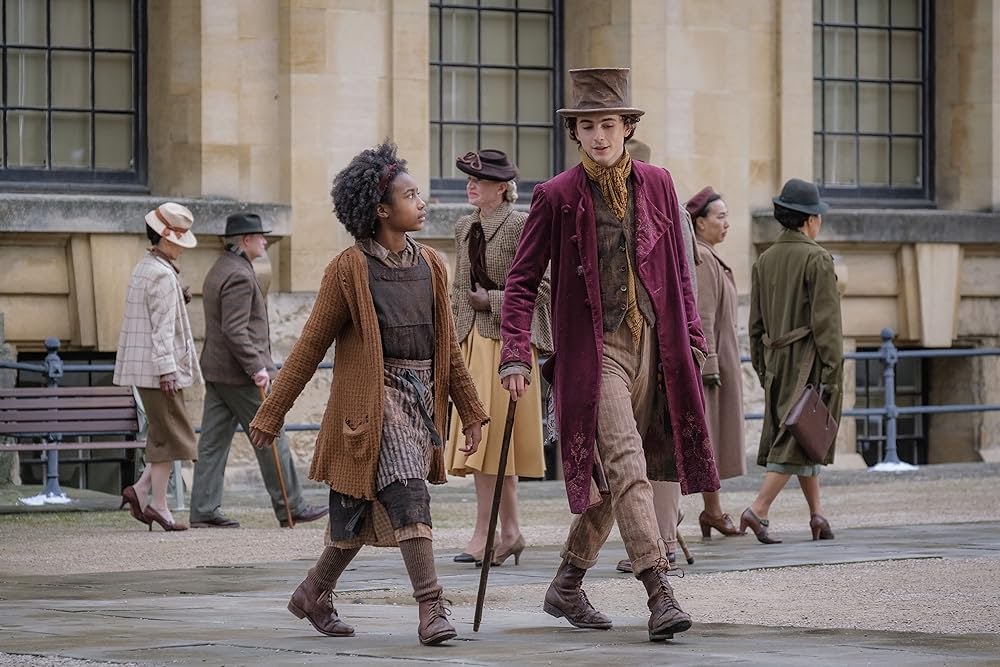Grade: (7.3/10)
Wonka tracks Willy’s journey from obscure boy to renowned chocolatier. Along the way, he makes friends who help him overcome corruption and greed.

Plot (43/50)
If you’re looking for a fun holiday movie, you’re in luck. Wonka tells a focused story with simple themes at a consistent pace. It starts with Wonka arriving to town optimistic about opening his own shop. Unfortunately, his kindness and trust in strangers is taken advantage of, and he quickly finds himself in a hole. He then makes some friends, and with their help, he slowly makes his way back to his goal of opening a store. More setbacks almost force Wonka out of town, but he returns to take down the corrupt chocolatiers once and for all.
Read the Fine Print
The movie starts with a young Willy Wonka arriving to a town renowned for its chocolate. All he has on him is his mini chocolate factory and 12 Sovereigns. As he goes through the town, he burns through all his money on mostly exploitative and/or unreasonable charges. Willy trusts in the kindness of strangers, so he doesn’t quite get the message that this is a greed-driven corrupt town. By the end of the day, he doesn’t have enough money to even pay for a room, so he plans to sleep on a bench outside. That is until Bleacher and his dog, Tiddles.
Bleacher offers to help Willy out by finding him a room. He takes Willy to Mrs. Scrubbit’s Inn. The two put on a nice act, but their intentions are far from nice. Mrs. Scrubbit offers to let Willy stay the night for only one Sovereign on the condition that he pay the following day. She rolls out a contract for Willy to sign, and despite being warned about the fine print by Noodle, one of Mrs. Scrubbit’s subordinates, he signs it anyways.
The next day, Willy makes his to way to the town square. He wows onlookers with his performance, but the three major chocolatiers take notice and immediately call the police. Willy ends up selling all the chocolate he has, but when the police arrive to confiscate his earnings, he’s left with nothing once again. Officer Affable is kind enough to give him one Sovereign so he can pay off Mrs. Scrubbit. Unfortunately for him, he’s incurred 10,000 Sovereigns worth of charges, and thanks to the small print, he must work in the laundromat at a rate of one Sovereign a day until he pays his debt off.
The Escape
Willy joins Noodle and four other individuals under Mrs. Scrubbit’s thumb: Abacus Crunch, an accountant, Lottie Bell, a telephone operator, Piper Benz, a plumber, and Larry Chucklesworth, a failed comedian. They’ve all concluded that there’s no way out of their current predicament. The door is guarded by Tiddles and they must report to regular roll calls. Even if they were to escape, the police would catch them and return them to Mrs. Scrubbit per the terms of the contract they signed. Willy, however, would not be deterred.
Together with Noodle, he puts together a plan that distracts Mrs. Scrubbit and allows him to escape long enough to gather the giraffe’s milk he needs to make more chocolate. He’s able to return undetected. Later that night, the Oompa Loompa that’s been stealing his chocolate shows up once again, but this time, Willy’s set a trap. The unsuspecting Oompa Loompa, Lofty, falls right into the trap. Lofty explains that he’s simply taking back what’s his after Willy took four cocoa beans from under his guard years ago. Lofty tricks a foolishly trusting Willy into releasing him, after which he escapes with Willy’s jar of chocolate.
This sets Willy back to square one. He shares the update with Noodle and the rest. Together, they come up with a new plan that involves them legally renting out the vacant store so that they can sell enough chocolate to pay Mrs. Scrubbit back. The following day, they set their plan in motion. Soon enough, they have the store to themselves. Their grand opening is a major hit, and for a while, it looks like their plan is working. Unbeknownst to them, Slugworth and co. had poisoned Willy’s chocolate. This sparks an outrage among customers who then trash Willy’s store.
Sharing Chocolate with the World
Willy’s friends return to their captivity under Mrs. Scrubbit, but Willy can still help them. Slugworth and co. make an offer to pay off all of his friends’ debt. All Willy has to do is leave town and never come back. Willy agrees and boards the next boat out of town, where he’s joined by Lofty (who still demands repayment). Soon after, Willy notices a mark on his hand made by Slugworth’s ring when they shook hands. The mark bears a strong resemblance to the ring Noodle wears around her neck. Willy realizes that because the two are related, Noodle is still in danger. He and Lofty jump off the boat right before it explodes.
Willy’s suspicions prove correct, so he gathers his now-released friends to rescue Noodle. Next, they hatch a plan to bring down the chocolate cartel once and for all. To do so, they will need to get their hands on the ledger that details all the cartel’s illicit activities. Willy and Noodle manage to get past all the security, but when they finally find the ledger, Slugworth and co. arrive. They’re thrown into the vault of chocolate and left to drown. As a final wish, Willy hands Slugworth a jar of chocolate and asks him to give it to Lofty to clear his debt. The three chocolatiers end up eating the chocolate. This prompts Lofty to drain the vault as repayment.
Willy and Noodle make their way to the town square with the ledger to expose the cartel. Officer Affable validates their claims and orders the arrest of the Chief as well as the three chocolatiers. Willy then releases the remainder of the chocolatiers’ chocolate reserves for all to enjoy, thus ensuring that they aren’t able to buy their way out of prison in the process. Willy shares his mother’s bar of chocolate with his five friends after reading her note. He then takes Noodle to meet her mother at the library. Finally, he teams up with Lofty to start his very own chocolate factory.
Overall Thoughts
Musical aside, this was a super solid movie. It was fun and low-stress, but that didn’t prevent it from maintaining its story. There was a consistency to the town’s corruption and Willy’s unwavering trust in strangers. There were enough setbacks to keep the audience engaged, but none too serious that they ruined the festive mood. I was a bit impressed with the commitment to plugging loose ends (even Mrs. Scrubbit and Bleacher paid for their sins). The tie-in to Willy’s relationship with his mother was genuinely touching. The payoff at the end gave meaning to the story in way that felt natural.

Character Development (11/15)
In terms of general direction, the focus was on showcasing the inherent qualities of the characters as opposed to tracking their development. Willy’s development was a bit more nuanced, but even his character didn’t experience much evolution. This approach was consistent with the movie’s positive tone.
Willy Wonka
Willy arrives to town as a boy whose trust in the kindness of strangers is naively unconditional. His happy-go-lucky demeanor coupled with his illiteracy makes him the perfect victim for scammers like Mrs. Scrubbit. Even after suffering dire consequences, Willy remains as gullible as ever. I’m not even sure gullible is the right word, because it implies that he doesn’t have a choice in the matter. In reality, Willy repeatedly chooses to put his faith in others knowing that some will betray that faith. That’s a price he’s willing to pay since it sometimes brings him closer to good people who repay his faith, people like Noodle.
Willy’s friendship with Noodle is given more time to develop than any other relationship because her qualities complement his. Willy’s bold and charismatic nature puts him into avoidable situations that are a direct result of his impulsive decision-making. Noodle, on the other hand, is methodical and realistic. She grounds Willy’s plans in reality so that if things go south, he’s better prepared. Noodle also teaches Willy how to read, but she doesn’t do it out of a desire to change his personality. She recognizes that optimism is a fundamental part of who he is. By equipping him with the knowledge to address his weaknesses, he can more comfortably play to his strengths.
There’s a moment where Willy talks about Noodle’s supposed “orphan syndrome” that feels like he’s talking about himself. Willy is motivated by the dream of sharing chocolate with others because he believes doing so will allow him to see his mother again. Along the way, he learns that life is about the experiences that you share with others. Chocolate is important to him because he shared it with mother. He has that same warm feeling when he eats his mother’s bar of chocolate because he’s sharing it with his friends. It’s a great moment for Willy because he instantly replaces one core motivation with another.
Theme/Messages (4/5)
- Life is about the experiences you share with others. Material things should only serve to enhance said experiences, not replace them.
- “The greedy beat the needy every time.”
Acting (15/15)
There weren’t any groundbreaking performances in this one, but just about everyone on the cast was fantastic in their role. Timothée Chalamet (Wonka) brings life to a quirky, optimistic Willy, and it works. His performance was focused but unserious, which is exactly what this sort of story needed from him. I was also impressed with Calah Lane (Noodle). She was tasked with complementing Chalamet’s effervescence with a more muted performance, and she did just that. Despite Noodle’s negative tone, Lane’s enthusiasm still shone through.
Other notable performances include Hugh Grant (Oompa-Loompa), Rowan Atkinson (Father Julius), and Sally Hawkins (Willy’s mom). Sally Hawkins, in particular, stole the show in the limited time on screen. She brought so much emotion to her scene with Chalamet early on. It’s the type of performance that immediately gets the audience invested in the characters. Her brief reemergence at the end of the movie was a touching moment.
Cinematography (0/15)
I don’t enjoy musicals. The only way I can judge them is by how disruptive the singing was to the actual story. In this case, the musical element was distracting, so it’s a zero from me in this section.